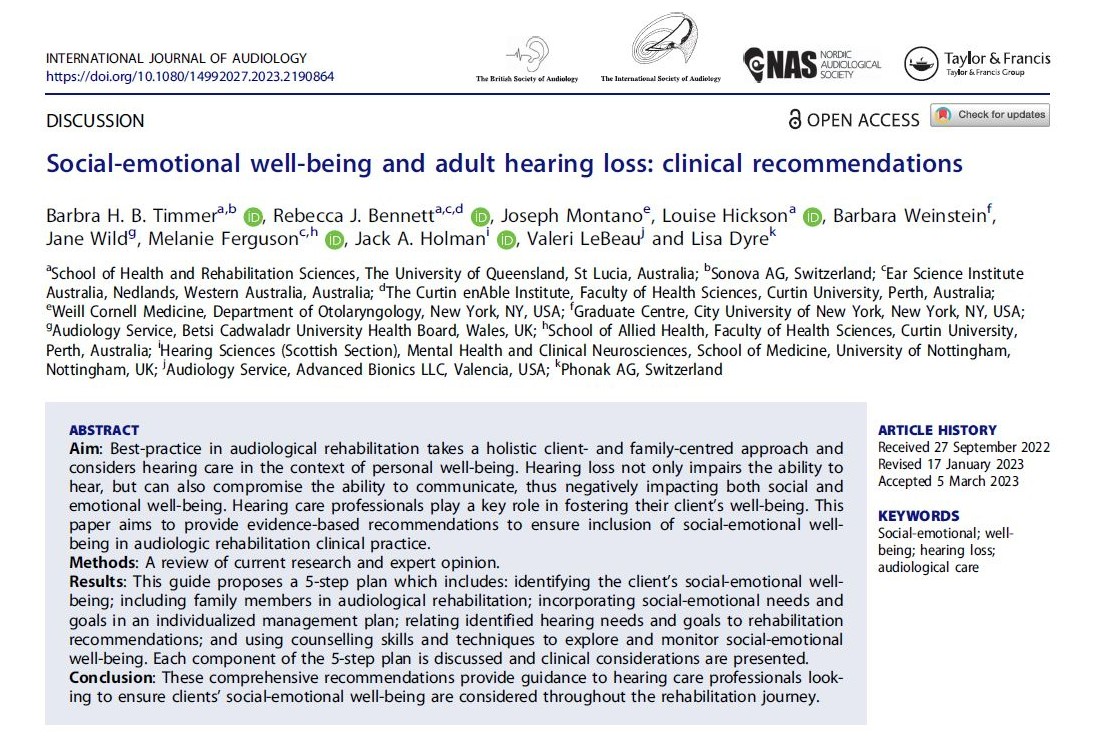
New clinical guidelines address hearing care in context of well-being
This evidence-based publication includes a 5-step plan to guide hearing care professionals in fostering their clients’ social-emotional well-being.
Best-practice in audiological rehabilitation takes a holistic client- and family-centered approach and considers hearing care in the context of personal well-being. Hearing loss not only impairs the ability to hear, but can also compromise the ability to communicate, thus negatively impacting both social and emotional well-being.1 This link between hearing well and well-being was discussed at an international scientific conference convened by Phonak some time ago.
One of the pre-conference workshops kicked off the start of a group collaboration between international hearing care researchers and clinicians which I was fortunate to convene. An outcome of that collaboration is a new, recently published clinical guideline, which recognizes the important role that hearing care professionals (HCPs) play in managing their clients’ social-emotional well-being.
The guideline recommends a 5-step approach.2
Step 1: Identify the client’s social-emotional well-being
The clinical guidelines suggest the use of tools and questioning as well as referrals to take a multidisciplinary approach in supporting the social-emotional well-being of adults with hearing loss.
Step 2: Include family members in audiological rehabilitation
Family members and significant others should be incorporated in all aspects of audiological rehabilitation. The use of online and tele-practice tools can help with this.
Step 3: Incorporate social-emotional needs and goals in an individualized management plan
HCPs should create a verbal and written individualized management plan and agree with clients and their family on goals and actions related to the client’s communication and social-emotional needs. Outcomes should be measured to ensure goals have been met.
Step 4: Relate identified hearing needs and goals to rehabilitation recommendations
The recommendations made by HCPs to meet agreed goals should include not only appropriate hearing devices but also auditory, communication and social training. This ensures social-emotional needs are also supported.
Step 5: Use counselling skills and techniques to explore and monitor social-emotional well-being
The counselling provided by HCPs should have an appropriate balance of information provision and approaches that support emotional adjustment thought out the client’s hearing rehabilitation journey.
Written by an international team of researchers and clinicians, the clinical guidelines provide evidence-based guidance and tools to help HCPs implement each of these 5 steps. The full peer-reviewed clinical guidelines can be accessed here.

References:
- Bennett, R. J., Saulsman, L., Eikelboom, R. H., & Olaithe, M. (2022). Coping with the social challenges and emotional distress associated with hearing loss: A qualitative investigation using Leventhal’s self-regulation theory. Int J Audiol, 61(5), 353-364.
- Timmer, B. H. B., Bennett, R. J., Montano, J., Hickson, L., Weinstein, B., Wild, J., Ferguson, M., Holman, J. A., LeBeau, V., & Dyre, L. (2023). Social-emotional well-being and adult hearing loss: clinical recommendations. International Journal of Audiology, 1-12. https://doi.org/10.1080/14992027.2023.2190864
